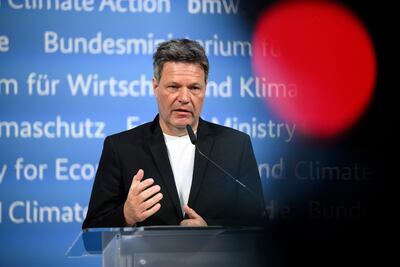Live updates: follow the latest news on Russia-Ukraine
Germany invoked an emergency energy plan on Wednesday and told its citizens to save power because of Russia’s threat to cut off gas supplies.
The early warning issued by Economy Minister Robert Habeck is the first of three potential alert levels and comes after Russia demanded payment in roubles for energy shipments to countries it deems unfriendly.
Mr Habeck described that demand, which was rejected by G7 members including Germany as a breach of contract, as an attempt by Russian President Vladimir Putin to work around sanctions linked to the war in Ukraine.
Although Germany is still receiving oil and gas deliveries, Russia is expected to press ahead with its currency switch this week and the Kremlin said on Tuesday that “nobody will supply gas for free”.
Mr Habeck said Russia’s statements prompted the emergency plans being triggered early on Wednesday, which will see a task force appointed in Berlin meeting daily to monitor the energy situation.
The panel will include delegates from Germany’s energy grid regulator, which has already held talks with businesses to prepare for potential shortages next winter if Russia turns off the tap.

But Mr Habeck told consumers that cutting their energy use in the shorter term could “help us, help Germany and help Ukraine”.
“In this situation, I have to say clearly that every kilowatt hour of energy that is saved helps,” he said at a press conference on Wednesday.
Germany has previously relied on Russia for the majority of its gas imports and much of its coal and oil, a reliance described as a mistake by Mr Habeck and which his ministry is scrambling to cut down.
Two import terminals are planned to handle liquefied natural gas, for example from the US, and Germany is looking at renting floating LNG terminals in the Baltic and North Seas until permanent facilities are built.
However, plans drawn up by Mr Habeck’s officials do not envisage Germany being independent of Russian gas until the summer of 2024.
The potential energy crunch comes at a time when Germany is moving to phase out coal power and plans to switch off its last three nuclear reactors by the end of this year.
Officials have ruled out postponing the nuclear switch-off on the grounds of practical difficulties such as fuel stocks being scheduled to be used up by December.
Mr Habeck said there was currently enough gas in the system and that Germany could live without Russian imports for the coming months, with the winter of 2022/23 regarded in Berlin as the potential flashpoint.
A worsening crisis could lead to the alert level being raised further to so-called alarm and emergency grades, in which the government could intervene directly in the energy market.
Leaders of the 27 European Union countries last week failed to agree a common approach to tackling an energy crisis in which prices were already soaring before the Russian invasion of Ukraine. Germany opposes an immediate embargo on Russian fossil fuel imports for fear of worsening the economic fallout at home.
Russia’s demand for roubles is regarded in the West as a ploy to shore up a currency that has taken a battering since sanctions were imposed over Ukraine.
Most imports are currently paid for in euros and dollars, and any exchange in roubles might involve dealing with Russian banks cut off from the global market by western sanctions.










































